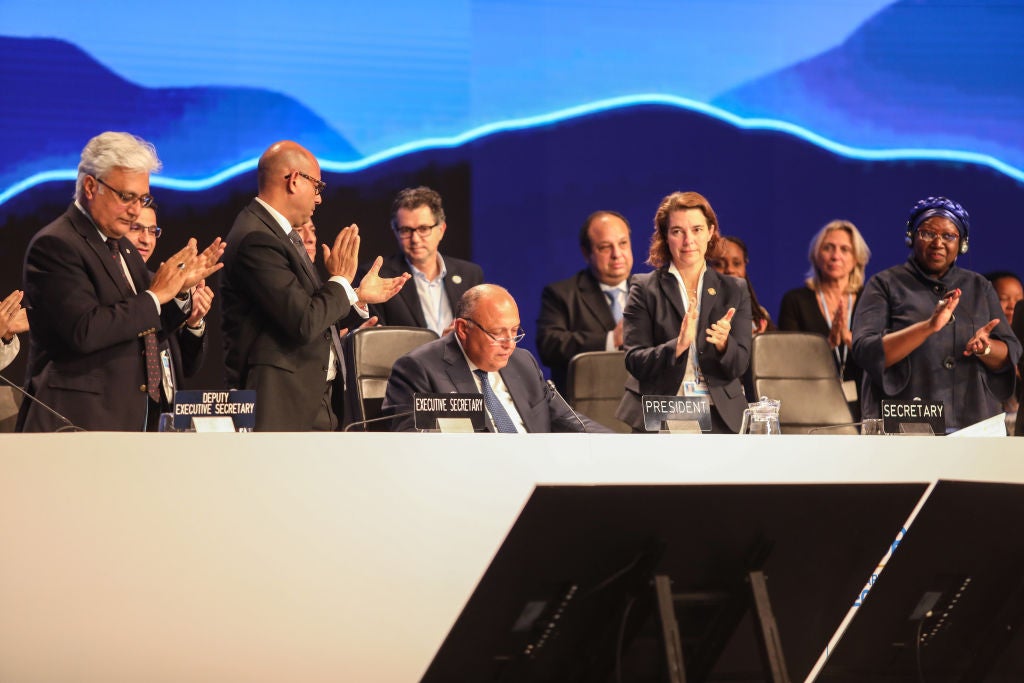Delegates at the COP27 UN climate talks in Sharm El Sheikh, Egypt, clinched a hard-fought agreement to create a loss and damage fund early Sunday morning, but for campaigners it was the lone victory in an otherwise dismal outcome.
NGOs heralded the creation of the fund, sometimes referred to as ‘climate reparations’ since it makes developed countries financially liable for the effects of climate change in poor countries, as a major breakthrough after 30 years of resistance by developed countries. The issue was only added to the agenda reluctantly at the start of the summit, and the prospect of agreeing the fund at this COP only became possible on Thursday when the EU surprised delegates by announcing it was dropping its opposition.

Access deeper industry intelligence
Experience unmatched clarity with a single platform that combines unique data, AI, and human expertise.
However, the two red lines that EU climate chief Frans Timmermans said the EU needed in return – all countries committing to peak emissions by 2025 and phase down fossil fuels, and that rich non-Western countries should pay into the loss and damage fund – were rejected by developing countries.

“We are faced with a moral dilemma, because this deal is not enough on mitigation,” Timmermans lamented in the closing plenary Sunday morning. “But do we walk away and thereby kill a fund that vulnerable countries have fought so hard for for decades?”
The COP27 outcome does not oblige major emitters like China to increase and accelerate their emissions cuts. “It does not bring a higher degree of confidence that we will achieve the agreements made under the Paris Agreement and in Glasgow last year,” Timmermans told the plenary. “Too many parties are not ready to make more progress today in the fight against the climate crisis. There were too many attempts to even roll back what we agreed in Glasgow.
“I urge you to acknowledge when you walk out of this room that we have all fallen short,” he admonished the room. “We have lost speed since Glasgow, we have wasted a lot of time.”

US Tariffs are shifting - will you react or anticipate?
Don’t let policy changes catch you off guard. Stay proactive with real-time data and expert analysis.
By GlobalDataDeveloped gave an inch, developing took a mile
Developed country delegates left the COP Sunday morning exhausted and fuming, upset that their significant compromise in agreeing a fund they had opposed for years was not met by any offer by developing countries to strengthen emissions-reduction targets or phase down fossil fuels. “We spent all of the past two weeks just trying to stop [the] 1.5°C [Paris Agreement target] from being eroded,” one European delegate said leaving the summit. “All we heard was ‘the EU is scaling back climate ambition [because of the Ukraine War and resulting energy crisis] so why should we act?’, which isn’t true. Basically, we were told we could forget about increased ambition this year.”
On Saturday, Timmermans and the EU ministers at the summit, including German Foreign Minister Annalena Baerbock, threatened to walk away from COP27 with no agreed text rather than accept an outcome with no increased mitigation efforts. In the end, they did not – a decision welcomed by NGOs.
“It was absolutely right that the EU allowed this process to go through,” Teresa Anderson from the NGO ActionAid told Energy Monitor as she was leaving the summit. “We have been asking for 30 years for the UN climate talks to help people harmed by climate change. This may have been our last best chance of getting this over [the line], so we had to make it happen.”
COP27 outcome: Will next year in Dubai be similar?
One delegate described the COP27 outcome as “control C, control P” given that it simply copied the language of last year’s COP26 in Glasgow. That means the next hope for action is at COP28 next year in the United Arab Emirates. However, people leaving Sharm El Sheikh today said they worry it will be another year of simply trying to preserve the Paris Agreement and what was agreed at Glasgow.
“We needed a swift, just and equitable phase-out of fossil fuels, and the COP has, yet again, failed to deliver,” said May Boeve from the NGO 350.org. “The breakthroughs on loss and damage are testament to the incredible work of civil society from the most impacted countries, but without a phase-out of fossil fuels we are setting the world on a path for further losses and damages. This is where the COP has failed.”
[Keep up with Energy Monitor: Subscribe to our weekly]
Even the details of the loss and damage fund have been left until next year in Dubai to work out – in particular the most contentious issues of who will pay in and who can draw out. The West is determined that China will be a payer and not a recipient, but Beijing will continue to oppose this at all costs, pointing to the common but differentiated responsibilities principle recognised at the 1992 climate summit in Rio. However, Western diplomats continually made the point over the past two weeks that much has changed since 1992 and China can no longer pretend to be a poor country now that it is emerging as the world’s biggest contributor to global warming.
The loss and damage deal was a significant accomplishment for campaigners. Overall, however, Sharm El Sheikh feels like a wasted COP and the trends seem to suggest that Dubai will be another. This has damaged the credibility of the UN Framework Convention on Climate Change ‘COP system’, with some questioning whether these yearly two-week summits are really the best way to establish a global framework to fight climate change.
This article originally appeared on Energy Monitor.

